Make the Philippines Great Again Case Study Chegg
- Original commodity
- Open Access
- Published:
Contract cheating by STEM students through a file sharing website: a Covid-19 pandemic perspective
International Journal for Educational Integrity book 17, Article number:3 (2021) Cite this article
Abstruse
Students are using file sharing sites to breach bookish integrity in light of the Covid-19 pandemic. This paper analyses the use of one such site, Chegg, which offers "homework help" and other academic services to students. Chegg is often presented as a file sharing site in the academic literature, just that is only one of many ways in which it can be used. Every bit this paper demonstrates, Chegg tin and is used for contract cheating This is despite the credible existence of an Accolade Code on Chegg which asks students non to breach academic integrity. With pandemic led prophylactic considerations leading to increased online instruction and assessment, the paper analyses data relating to how Chegg is used by students in five STEM subjects, namely Computer science, Mechanical Engineering, Electric Engineering, Physics and Chemistry. The results show that students are using Chegg to request exam manner questions. They demonstrate that contract adulterous requests can be put alive and answered within the curt duration of an test. The number of student requests posted for these five subjects increased past 196.25% comparing the time menstruum April 2019 to August 2019 with the period April 2020 to Baronial 2020. This increase corresponds with the time when many courses moved to exist delivered and assessed online. The growing number of requests indicates that students are using Chegg for assessment and test help ofttimes and in a way that is not considered permissible by universities. The paper concludes past recommending that bookish institutions put interventions in place to minimise the adventure to educational standards posed by sites such as Chegg, particularly since increased online teaching and assessment may go on later the pandemic.
Introduction
This newspaper reports on the growth of how a single market leading file sharing website has been used for contract cheating purposes. The period of growth coincides with the Covid-xix pandemic and the associated necessary increment in online teaching and assessment within educational activity.
Rogerson and Basanta (2016) define file sharing as beingness "when academic lecture materials, notes, assessment tasks, answers, and responses are shared, swapped, and traded over Net-based sites in fee, gratuitous, or castling (credit/exchange) arrangements". Although student collaboration is oft encouraged within an educational setting, a challenge with file sharing comes when students share files owned past a university with commercial providers. These providers so sell materials which they take no ownership claim over to other students. Oftentimes a barter organization is used, with other students encouraged to upload more materials so that they tin can themselves get access to other resources and answers. Likewise as breaching copyright and instructor rights of intellectual property, this besides has commercial implications for educational providers. Dixon and George (2020) review the value of content on a unmarried file sharing site and guess that the materials for a ofttimes taught course at a unmarried university cost $lxx,000 United states Dollars (USD) to produce. They estimate the value of a program refreshed every 5 years as existence $3.5 million USD over that time menstruation, a sizeable value potentially lost from educational providers.
The use of file sharing sites to breach academic integrity has received little attention in the academic literature. Various terms are used to be describe file sharing sites, including in the literature and by the sites themselves. These terms include crowd sourcing sites, report aid sites and peer-to-peer platforms. Example file sharing sites include OneClass (2020), Chegg (2020), Course Hero (2020) and Thinkswap (2020). This is non a complete list and file sharing sites exist aimed at only at private universities and in several languages. In many ways, these sites can exist considered as an extension of traditional fraternity-based archives of previous assignment solutions, designed to give fraternity members an unfair advantage.
Although file sharing sites are already ethically questionable, a further challenge comes when they can likewise be used for commercial contract cheating purposes. Contract cheating, originally discussed by Clarke and Lancaster (2006), takes place when a student employs a third political party to complete assessed work for them. Many file sharing sites contain a department of the site which tin can be used for contract cheating purposes, often billed every bit providing "homework help". Although traditionally contract cheating requests are sold only to a single student, file sharing sites often operate with a variant strategy where answers can be made available to many students, once the appropriate payment has been made or bartering has concluded.
This paper considers how contract adulterous takes place on the market leading file sharing site Chegg (2020). It makes reference to the book of requests made and answers supplied pre and postal service Covid-19. The pandemic has seen the movement of instruction and assessment online, oftentimes made with little time for the revised method of provision to accept been planned in advance or for bookish integrity safeguards to exist put into place. Where students have previously been taught contiguous, activities such as in-person lectures, tutorials, assessments and exams have been replaced by virtual alternatives. The unsupervised nature of assessment, including exams, may hateful that students have had increased temptation to cheat or may have felt that the support they would normally have available was not in that location.
The paper outset discusses the relevant literature surrounding academic integrity, contract adulterous and online exams in more than particular. Online teaching and assessment are not in themselves new, even though changes to cess due to Covid-19 may have fabricated this more than prominent. The Chegg file sharing site is farther discussed, with reference to how this can be used for contract cheating purposes. The paper provides a quantitative assay of how Chegg is used for contract cheating within a option of Scientific discipline, Technology, Engineering and Mathematics (STEM) subjects, offering an analysis over a ii-year catamenia with reference to pre and mail service Covid-nineteen provision. The paper concludes past recommending that the sector works to address contract cheating through file sharing sites specially as this relates to Covid-nineteen.
Groundwork
Many forms of assessment are susceptible to contract cheating. The literature in this field has revealed that an aggressive manufacture exists, aiming to implore students to cheat (Ellis et al. 2018; Lancaster 2020a). Contract cheating solutions tin be purchased cheaply by students, frequently from writers operating in economic surroundings where incomes are typically low (Lancaster 2020b). Contract adulterous solutions can also exist provided quickly (Wallace and Newton 2014). This includes providing them within the limited time bachelor for a standard online exam.
Where courses are taught online, contract adulterous is a particular risk. Lancaster and Clarke (2014) reviewed how students at online universities were using a site that nominally stated it connected students with tutors for contract adulterous. They constitute the bulk of requests were from the U.s., mainly from the Business and Computing subject areas. Students themselves working as academic integrity partners with educators accept subsequently begun to employ the term "toxic tutors" to describe those individuals advertising themselves every bit providing help, just really at that place to do work for students (ICAI 2020). Students have advised their peers to advisedly consider the services tutoring services say they offer and to cull providers with care to avert accidentally breaching bookish integrity.
Examinations themselves have also been found to be susceptible to contract adulterous. Lancaster and Clarke (2017) identified a broad range of sites that could be used to provide students with unauthorised exam assistance, including tutorial sites. Where exams are online, remote proctoring services that utilise cameras to check the activities of students take been suggested equally possible solutions. However, experts have warned most the dangers of such an approach. Eaton and Turner (2020) conducted a rapid review into literature on academic integrity relating to Covid-nineteen. They identified that students felt they were suffering from stress and anxiety, peculiarly when remote proctoring solutions were used to preserve academic integrity. Even so, when students are non monitored during examinations, they may exist able to turn to file sharing websites to request contract cheating solutions. Although farther enquiry in this field is necessary, this does illustrate the merchandise-off between the need to protect the value of academic awards, simply to still ensure that students feel supported and do non need to utilise suspect providers of services from outside their own academic institution.
Research has shown that cheating is more likely to occur during online exams than on-site exams. From a survey of accounting students, Rex et al. (2009) found that students believed that adulterous in online exams was easier than cheating in exams held in person. They too noted that students said they would be less likely to cheat if instructors specifically told them that this was not allowed.
The solutions to exam integrity breaches through file sharing websites need to exist considered. Cluskey Jr et al. (2011) suggested changing the questions for online exams every time they run. This would foreclose standard answers being already bachelor on file sharing websites, just that, in itself, would not seem to be a solution to contract cheating.
Clark et al. (2020) have recommended specific solutions to online exam integrity in light of Covid-xix. They found that contract cheating was occurring in online chemistry exams and suggest watermarking exam materials to make them more hard to share with contract adulterous providers. They likewise recommend the use of unique data sets for private students to work on. This ways that if questions are placed on a visible file sharing site, the educatee with that data fix allocated to them can be traced. Even where this is not a viable solution, it can be possible to detect contract cheating, including answers obtained from file sharing sites. Rogerson (2017) provided indicators for assessors to look out for, including citation and referencing irregularities, besides as the use of inconsistent language.
Quantitative bookish research relating to the use of file sharing sites by students is express. In a report conducted pre Covid-19, Bretag et al. (2019) surveyed students at Australian educational institutions and asked them about their file sharing tendencies. They plant that 15.3% said they had brought or traded notes and 27.two% had provided assignments to other students. They institute that two.4% of students said they had received assist during examinations. Although these results are not specifically linked to file sharing websites, they do suggest that many students could be encouraged to use sites like these.
Grams (2011a, 2011b) tested the hypothesis that students would perform improve if they had legitimate and canonical access to the materials from a file sharing site. Grams noted that, despite students believing access would positively increase their grades, there was no noticeable difference betwixt students who were granted access to such a site for a twelvemonth compared to other students. Instructors generally had a negative opinion about the use of such sites. Grams also noted that the students preferred to learn from textbook solutions over those provided through the file sharing site being examined. Van de Sande (2011) independently reviewed the quality of solutions on such a site and constitute that 56% of them were not as good every bit those found in instructor solution manuals.
Ardid et al. (2015) constitute no deviation in the results students received when taking in-person and online exams, provided both types of exams were proctored. Even so, when students took the exam online and information technology was not proctored, students received higher marks than in a proctored state of affairs. A similar event was found by Nizam et al. (2020) in research conducted during Covid-19. They also found that students obtained higher marks in unproctored exams had higher marks than in proctored exams. This may be due to access to students having access to the contract cheating industry in such a situation.
If contract adulterous opportunities are growing as a effect of Covid-nineteen, at that place are other risks to consider. Yorke et al. (2020) accept warned how students are at hazard of blackmail, both during their course and following its completion. They have also shown that most students are unaware of the risks of using contract cheating providers.
Methodology
This written report reviews the available of contract cheating solutions through the file sharing site Chegg (2020). Amongst other services offered, Chegg provides a homework aid section, where people can post problems and request full solutions. These requests might include homework questions, textbook problems, assignments and exam questions. Free users can view questions, but not post them. Subscribers tin can post up to twenty questions per calendar month and view all answers. Answers can be provided by regular Chegg users, simply besides by a group that Chegg has certified every bit experts. Not every question receives an answer and questions can receive more one reply. The question archive is split into field of study categories making it possible to see how students cocky-classified their requests. This archive can also be searched by keyword.
For this study, the Chegg annal of homework help questions was examined for five subjects in the STEM grouping to provide an indication of how the site was being used. The subjects investigated were Informatics, Mechanical Engineering, Electrical Engineering, Physics and Chemistry. Quantitative information related to the number of questions posted per discipline per day was collected over a two-twelvemonth period from 1 September 2018 to 31 August 2020. The researchers did not subscribe to the Chegg service to collect this data, which was freely accessible and manually collected. The data was collected direct from the field of study level carte du jour on Chegg. The data gear up provides two complete years of Chegg information for the five subjects, allowing for comparisons between 1 September 2018 to 31 August 2019, with 1 September 2019 to 31 August 2020, dates roughly equivalent to the academic year in many countries.
For simplicity in the remainder of the newspaper, the menstruation from 1 September 2018 to 31 August 2019 will exist referred to as 18/19. The flow from 1 September 2019 to 31 August 2020 will be referred to equally 19/xx.
In addition, a single typical twenty-four hours was selected, consistent for each year. The number of questions that day receiving at least one answer was calculated. This unmarried twenty-four hour period comparison was intended to permit researchers to identify if, in the event of the number of questions asked changing, did this impact the number of questions existence answered?
Inquiry methodology limitations
Due to the labour intensive nature of this enquiry, data collection was restricted to a limited range of subjects for a 2-year period. The subjects were selected to exist Stem based to let this field to be considered in more than depth. The timeline for data collection was considered to allow the impact of Covid-19 to be explored with relation to contract cheating. The research likewise but considers a single file sharing site, then it is not certain if these results will generalise to other such sites.
Results and give-and-take
In total, across the 5 analysed subjects there were 3,050,372 questions posted during 18/19 and v,335,770 questions posted between during 19/20. This showed an increase in the number of questions posted of 74.92% from eighteen/19 to nineteen/twenty. The boilerplate (mean) number of questions posted in 18/nineteen was 8357 and in 19/xx was xiv,578. Table one shows this calculation on a subject basis.
The number of questions asked and answered on ane March each twelvemonth was as well calculated. 8 thousand two hundred seventy-six questions were posted i March 2018 beyond all v subjects. These were answered 89.96% of the time. 13 thousand seven hundred nineteen questions were posted on 1 March 2020 and answered 85.57% of the time. Despite the slight drop in the percentage of questions answered, the raw numbers showed a substantial quantitative increment.
Table 2 shows this data at subject level for 1 March each twelvemonth. Of annotation is the decrease in the percentage of answered questions in Computer Science, although this is still an increase in numeric terms.
The boilerplate number of questions per twenty-four hours per month was also calculated at a subject level and compared on a calendar month-by-calendar month basis. This showed a striking outcome. Between September and March, inclusive, the percentage increase never exceeded 32.27% for any of the subjects. Between Apr and August, inclusive, the smallest increase was 80.08% and the largest increment 343%. Table 3 provides an example of this for Chemistry every bit monthly averages. The blueprint shows a slight increase in March equally universities began to motility to online teaching, so a much greater increase from April onwards.
Figures 1, 2, 3, 4 and five graphically illustrate the average number of questions asked per day per month for each subject beyond the eighteen/19 and 19/20 menstruation. Although the numbers differ slightly, the graphs evidence a largely similar shape. They illustrate two peak request times for contract cheating services each twelvemonth, with one in April–May and another in October–Nov. These may link with university cess periods. The Apr–May peak for 19/20 is of a greater club of magnitude than that from 18/nineteen.
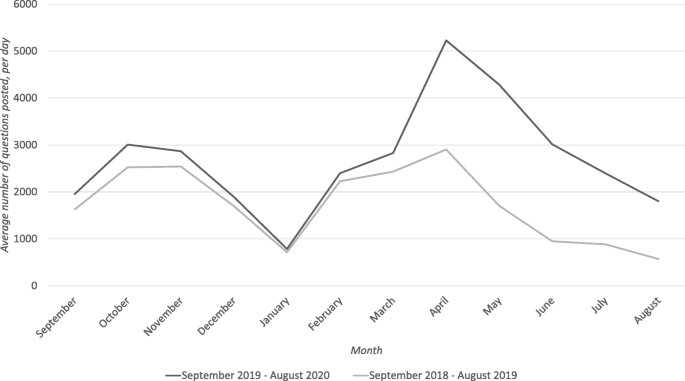
Questions per twenty-four hours per month of Computer Science questions posted between 18/nineteen and xix/20
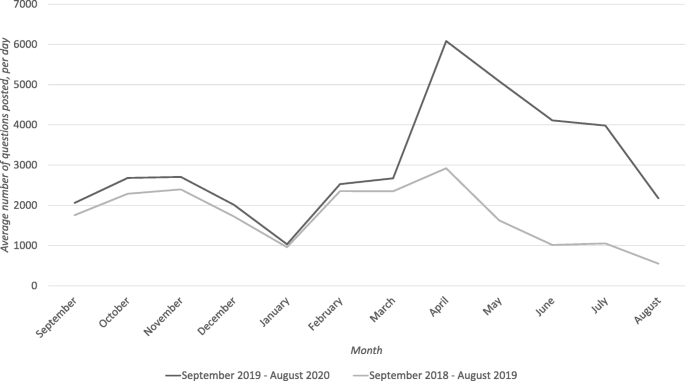
Questions per day per calendar month of Physics questions posted between 18/19 and 19/20
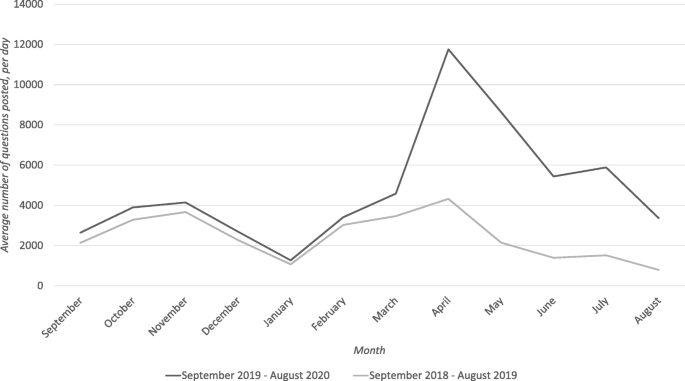
Questions per day per month of Chemistry questions posted between 18/19 and 19/xx
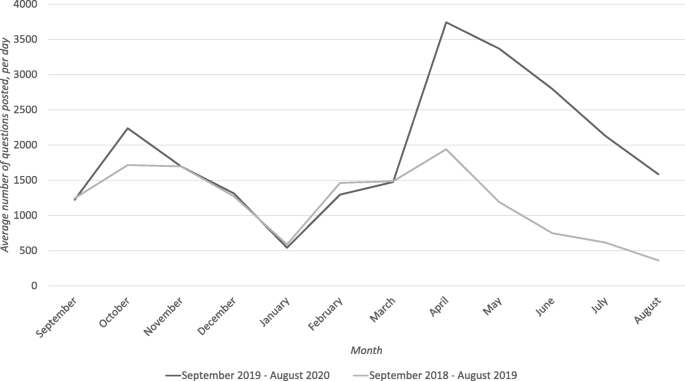
Questions per day per month of Mechanical Engineering questions posted betwixt 18/xix and 19/20
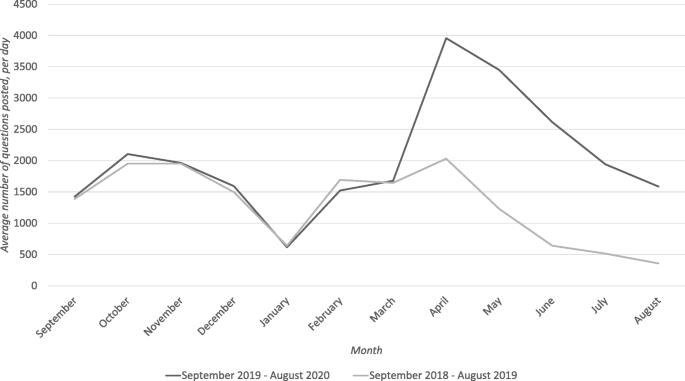
Questions per day per month of Electrical Engineering questions posted betwixt xviii/19 and nineteen/20
For case, in Fig. one (Estimator Science), the maximum summit values in xviii/19 in November was 2541 questions and in April was 2903 questions, only in 19/20, the tiptop in Nov was 2867 questions and in April this rose to 5228 questions. The graph also shows that the gradient of the gradient between the years later on Apr is very like, with the number of questions posted decreasing each month. Information technology is important to notice that these trends occurred regardless of the subject area. Based on the sample, information technology looks probable that the same tendency volition occur in subjects outside those selected for assay.
Figure vi shows similar information to Figs. 1, ii, 3, four and 5, only for the v subjects being considered taken as overall totals. The shape of the graph and the overall peaks are again consequent with the idea that the use of Chegg to request answers has increased yr-on-year in the post Covid-xix menses.
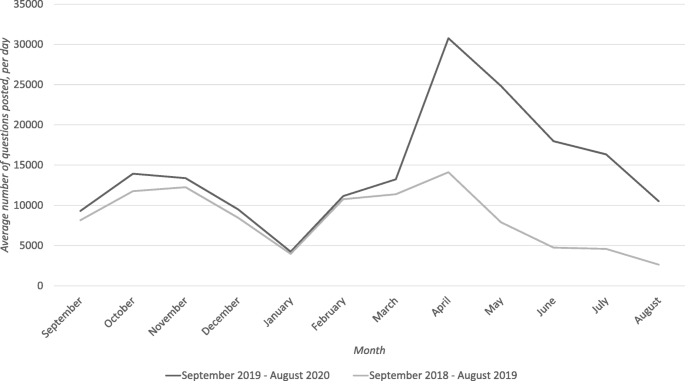
Questions per day per month of questions from all STEM subjects analysed, posted between eighteen/nineteen and xix/20
A farther assay considered the boilerplate number of questions asked per day in the September to March catamenia and in the April to Baronial period, compared over the 2 years. Between September and March, this showed an overall 12.68% increase between the years of the average number of questions posted per solar day per month, but between April and August the increment was 196.25%, which is a substantial difference. Furthermore, the boilerplate had dropped past 28.92% betwixt the September 2018–March 2019 and April 2019–Baronial 2019 periods, but increased by 87.74% between the September 2019–March 2020 and April 2020–August 2020 periods.
Tabular array 4 details the percentage changes over the two time periods at discipline level.
Although Table iv shows only a slight increase in the number of questions posted during the September to March periods, the April to August periods show an overall increase of 196.25%. This indicates that the file sharing site has been used much more during this time. Like trends were observed beyond all five subjects. Chegg usage decreased budgeted August and September 2019, but increased in the post-obit year, further reinforcing the observation fabricated above.
Chegg do non provide the facility to trace requests straight back to an individual bookish provider, or even a state of origin. On occasion it may be possible to work this out, merely the fashion in which information is shown on the site makes this difficult. For instance, some posts contain photos or screenshots of a problem that is probable to have been encountered in a standard textbook. Such standard questions could be in use at many institutions.
Many questions list a number of available marks on them. Others appear to contain randomised variables. These are indicators that the questions are likely from online exams. Some questions contain both marks and randomised variables, every bit indicated past the Physics question example shown in Fig. 7.
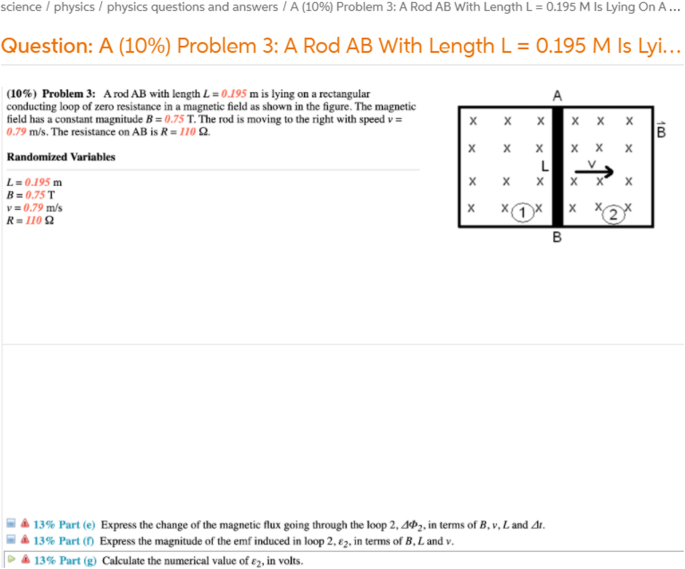
Example Question on Chegg likely from Online Exam
Students take also been observed posting a series of requests one after some other, most often where the questions are multiple choice or short reply format. Figure 8 shows one such example for Computer Science, with a question sequence that extended far beyond the small sample shown. As occurs with many questions on Chegg, these take the form of low-quality images, which would make any class of automated processing of these difficult. Questions requested past other students were made in between these, demonstrating simply how quickly requests appear on Chegg during peak periods.

Question Series Case on Chegg likely from Online Test
An interesting upshot of the Covid-19 pandemic is that there are many questions on Chegg whose themes include Covid-19. A pick of terms such equally COVID, pandemic and coronavirus were used every bit search terms across all questions on Chegg from all subjects. In every case, Chegg returned 500 results, which is the limit of the number of questions returned past a search. This indicates that students effectually the world are existence prepare questions on Covid-nineteen and that many of them are finding their way onto file sharing sites for third parties to answer on their behalf.
Conclusion
This paper has reviewed how a file sharing website popular with students is used to facilitate contract adulterous. There are many assessed coursework and exam questions posted and answered every day. The data shows a substantial increase in the number of questions asked and answered in the period from April 2020 onwards, largely matching with the move online of teaching and assessment. Given the number of exam fashion questions, information technology appears highly likely that students are using this site as an like shooting fish in a barrel way to breach academic integrity by obtaining outside help.
Using the fact that around 85% of questions asked are answered at to the lowest degree once, it is possible to approximate the number of questions answered each year. Based on Tabular array 2, this suggests that about two.6 million questions were answered out of the 3 meg questions posted in 2018–2019, and effectually 4.eight one thousand thousand out of the 5.3 1000000 questions in 2019–2020 were answered. This approximation covers only the five STEM subjects reviewed in the paper and not the other subjects from which Chegg also offers solutions to students. The number of questions asked and answered on Chegg each year is likely to be many times greater.
To have a successful and growing business and to deliver a return to its shareholders, Chegg depends on a continual growth in the number of subscribers it has. Based on the growth in the number of questions asked, this also suggests an increase in subscribers and thus the number of students who have access to the answers.
The credible growth in educatee adulterous also matches an increase in the market value of Chegg. Tabular array v contains the value of shares at the beginning of each calendar month, retrieved from Google after searching 'Chegg valuation'. Since not all months have an entry for the kickoff 24-hour interval of the month, the value has been obtained from the first bachelor appointment. Table v indicates that between October 2019 and May 2020 there was an increase of no more $fourteen USD, merely then the share cost increased past over $20 USD in the month following May.
In an interview, Chegg's main executive mentioned that they noticed a "sustainable growth" of the website starting from fifteen March 2020 (Gelles 2020). This further corresponds to the data presented in this paper and the increase in the market value of Chegg and suggests that contract adulterous may accept been a factor hither.
Chegg does claim to accept an Accolade Code in place. In the Honor Lawmaking, information technology is stated that Chegg does not support fraud, cheating or breaches of copyright and suggests that materials may be removed or user accounts terminated if academic institutions contact them to open an investigation. There is little show that account termination has happened. In addition, it appears that there is zip to stop students posting questions online and receiving answers within the time frame of an test. There does non seem to be any manual approval of requests or periods of delay before questions are put live to be answered. People, including Chegg certified experts, appear to exist prepare and waiting to respond questions as they are asked. This seems to provide show that the Chegg Honour Code organization is not working based on the book of requests for assessed piece of work that have been observed.
Some individuals have stated that requests tin can be fabricated to Chegg if their copyrighted education or assessment material is institute online (Murdoch 2020; Reddit 2020). This may include the details of accounts who have accessed the material, including their proper name, email accost and establishment. However, there has also been discussion online that the process is onerous, requires senior authorisation from universities and that students are given the opportunity to remove their accounts prior to the investigation so that no information tin can be transferred. This suggests that Chegg do not really want to eliminate contract adulterous.
Hereafter action in this surface area is necessary. This includes sensation raising with both staff and students. Using contract cheating services is non victimless and this has to exist communicated. Similarly, the messaging needs to provide consistent and clear advice that there are benefits to working with academic integrity and there are risks involved when breaching it. Staff should be encouraged to monitor file sharing sites for their assessments, just this tin be difficult when questions are posted as images rather than text. Some form of automated monitoring, with immediate reporting to instructors if their assessments or exam questions appear to exist establish online, would be a useful development.
Further research data could be collected from Chegg, covering more subjects over a longer fourth dimension menses. This investigation has focused only on STEM subjects, which typically accept many questions that are mathematical or scientific in nature. This may make this area easier for contract adulterous providers to requite quick answers for these subjects than it would be for those that are more text based or descriptive. In addition, content analysis of the questions posted would also be useful, simply that would most likely require an automated or car learning based arroyo. Although information technology is the market leader, Chegg is not the merely file sharing site. It would be instructive to see if the trends identified here extend more widely.
Bookish integrity breaches are happening and, every bit the data presented in this paper has demonstrated, such breaches are becoming more common as a event of Covid-19. These breaches do require a continued reconsideration of teaching and assessment methods. Even if contiguous didactics returns, it is unlikely that this will ever at present consistently take the same format it did prior to the pandemic. The genie is well and truly out of the bottle and there is no way to put the stopper back in. The unabridged academic integrity community, including but not limited to staff, students, bookish institutions, quality bodies and commercial providers alike, needs to be prepare and prepared to act.
Availability of data and materials
An anonymised version of the quantitative data analyzed during the electric current study is available from the corresponding author on reasonable request.
Abbreviations
- ICAI:
-
International Eye for Academic Integrity
- IDOA:
-
International Day of Action against Contract Cheating
- Stem:
-
Science, Engineering science, Engineering science and Mathematics
- USD:
-
United states of america Dollars
References
-
Ardid Thou, Gómez-Tejedor J, Meseguer-Dueñas J, Riera J, Vidaurre A (2015) Online exams for composite assessment. Study of different application methodologies. Comput Educ 81:296–303. https://doi.org/10.1016/j.compedu.2014.10.010
-
Bretag T, Harper R, Burton Grand, Ellis C, Newton P, Rozenberg P, van Haeringen G (2019) Contract cheating: a survey of Australian academy students. Stud High Educ 44(eleven):1837–1856. https://doi.org/10.1080/03075079.2018.1462788
-
Chegg (2020). Get 24/7 homework help. http://chegg.com/ Accessed 22 Nov 2020
-
Clark T, Callam C, Paul Northward, Stoltzfus Yard, Turner D (2020) Testing in the time of Covid-19: a sudden transition to unproctored online exams. J Chem Educ 97(9):3413–3417
-
Clarke R, Lancaster T (2006) Eliminating the successor to plagiarism? Identifying the usage of contract cheating sites. Proceedings of 2nd international plagiarism conference. Newcastle, United kingdom
-
Cluskey Chiliad Jr, Ehlen C, Raiborn Thou (2011) Thwarting online examination adulterous without proctor supervision. J Acad Business organization Ethics 4(1):1–seven
-
Dixon Z, George K (2020) Monitoring uncharted communities of Crowdsourced plagiarism. J Acad Ethics. https://doi.org/ten.1007/s10805-020-09381-2
-
Eaton Southward, Turner Grand (2020) Exploring bookish integrity and mental health during COVID-nineteen: rapid review. J Contemporary Educ Theory Res iv(two):35–41. https://zenodo.org/record/4256825#.X6gXr5NKhm8
-
Ellis C, Zucker I, Randall D (2018) The infernal business of contract cheating: understanding the concern processes and models of academic custom writing sites. Int J Educ Integr 14(1). https://doi.org/10.1007/s40979-017-0024-iii
-
Gelles, D. (2020). For online learning, business has never been better The New York Times June 12 2020
-
Grams Thousand (2011a) Cramster: Friend or foe? Phys Teach 49(four):225–227. https://doi.org/10.1119/i.3566032
-
Grams Thou (2011b) The Cramster conclusion. Phys Teach 49(5):291–294. https://doi.org/10.1119/1.3578424
-
Course Hero (2020). Make every report hour count. http://coursehero.com/. Accessed 22 Nov 2020
-
ICAI (2020). ICAI IDOA student group panel outset "newscast". Twenty Live in xx -- Global Conversations most Contract Cheating. https://www.youtube.com/lookout?five=2V-DDhYnksM. Accessed 22 Nov 2020
-
Rex C, Guyette R Jr, Piotrowski C (2009) Online exams and cheating: an empirical analysis of concern students' views. J Educ Online six(1):i–eleven
-
Lancaster T (2020a) Academic bailiwick integration by contract cheating services and essay mills. J Acad Ethics eighteen:115–127. https://doi.org/10.1007/s10805-019-09357-x
-
Lancaster T (2020b) Commercial contract adulterous provision through micro-outsourcing web sites. Int J Educ Integrity 16(4). https://doi.org/10.1007/s40979-020-00053-7
-
Lancaster, T and Clarke, R (2014). An observational analysis of the range and extent of contract cheating from online courses constitute on agency websites. In: Proceedings of 2014 Eighth International Conference on Complex, Intelligent and Software Intensive Systems (CISIS): 56–63. IEEE. https://doi.org/10.1109/CISIS.2014.9
-
Lancaster, T and Clarke, R (2017) Rethinking assessment by exam in the age of contract cheating. In: Glendinning, I, Foltýnek, T, Rybička, J (eds) Proceedings of Plagiarism across Europe and Beyond 2017. Brno, Czechia: 215–228
-
Murdoch, G (2020). Twitter. https://twitter.com/CC___Raider/status/1296628611210866690. Accessed 22 Nov 2020
-
Nizam N, Gao S, Li Grand, Mohamed H, Wang G (2020) Scheme for cheating prevention in online exams during social distancing
-
OneClass (2020). Personalized courses, study materials and homework assistance. http://oneclass.com. Accessed 22 November 2020
-
Reddit (2020). PSA: Here'due south the information Chegg volition requite an official investigation. https://www.reddit.com/r/Professors/comments/g1jiob/psa_heres_the_information_chegg_will_give_you. Accessed 22 Nov 2020
-
Rogerson A, Basanta G (2016) Peer-to-peer file sharing and academic integrity in the internet historic period. In: Bretag (ed) Handbook of Academic Integrity. Springer, Singapore. https://doi.org/10.1007/978-981-287-098-8_55
-
Rogerson AM (2017) Detecting contract adulterous in essay and report submissions: process, patterns, clues and conversations. Int J Educ Integr 13(1):10. https://doi.org/10.1007/s40979-017-0021-six
-
Thinkswap (2020). Handpicked report resources for students. http://thinkswap.com/ Accessed 22 Nov 2020
-
Van de Sande, C (2011). How are students' problems existence solved? The quality of worked solutions on a popular open, online, mathematics, help forum, In: Spada, H, Stahl Thousand, Miyake, Northward, Police force, North (eds) Proceedings of International Conference of Computer-Supported Collaborative Learning (CSCL 2011). Hong Kong: 280–287
-
Wallace MJ, Newton PM (2014) Turnaround time and marketplace chapters in contract cheating. Educ Stud 40(2):233–236, https://doi.org/10.1080/03055698.2014.889597
-
Yorke J, Sefcik 50, Veeran-Colton T (2020) Contract cheating and blackmail: a risky business? Studies in Higher Education: 1–14. https://doi.org/10.1080/03075079.2020.1730313
Funding
This research was partially funded by the Majestic Higher London StudentShapers program. The student partner, Codrin Cotarlan, received a bursary to back up his participation.
Author information
Affiliations
Contributions
Both authors contributed to developing the research study and collaborated throughout. Codrin Cotarlan collected and analysed the inquiry data and documented the results. Both authors contributed to dissimilar sections of the paper. Thomas Lancaster edited and produced the final version of the paper. The author(due south) read and approved the final manuscript.
Respective author
Ethics declarations
Competing interests
The authors take no competing interests.
Additional data
Publisher'due south Annotation
Springer Nature remains neutral with regard to jurisdictional claims in published maps and institutional affiliations.
Rights and permissions
Open Access This article is licensed nether a Creative Commons Attribution iv.0 International License, which permits utilise, sharing, adaptation, distribution and reproduction in any medium or format, as long every bit you give appropriate credit to the original author(s) and the source, provide a link to the Creative Commons licence, and indicate if changes were fabricated. The images or other third party material in this article are included in the article'due south Artistic Commons licence, unless indicated otherwise in a credit line to the textile. If material is not included in the commodity'due south Creative Eatables licence and your intended apply is not permitted by statutory regulation or exceeds the permitted use, you lot will need to obtain permission directly from the copyright holder. To view a re-create of this licence, visit http://creativecommons.org/licenses/by/4.0/. The Creative Commons Public Domain Dedication waiver (http://creativecommons.org/publicdomain/aught/ane.0/) applies to the data fabricated available in this article, unless otherwise stated in a credit line to the data.
Reprints and Permissions
Almost this commodity
Cite this commodity
Lancaster, T., Cotarlan, C. Contract cheating past STEM students through a file sharing website: a Covid-19 pandemic perspective. Int J Educ Integr 17, 3 (2021). https://doi.org/10.1007/s40979-021-00070-0
-
Received:
-
Accepted:
-
Published:
-
DOI : https://doi.org/10.1007/s40979-021-00070-0
Keywords
- Chegg
- Academic integrity
- Contract cheating
- File sharing
- Academic misconduct
- Online exams
- Assessment
- Covid-19
- Pandemic
Source: https://edintegrity.biomedcentral.com/articles/10.1007/s40979-021-00070-0
0 Response to "Make the Philippines Great Again Case Study Chegg"
Post a Comment